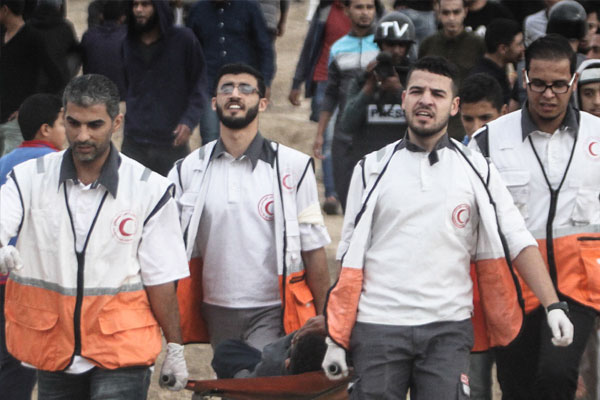WHO works closely with the Ministry of Health and Health Cluster partners to strengthen preparedness capacity of the Palestinian health system and its ability to respond to all hazards of public health significance, such as disease outbreaks, natural disasters, etc.
In 2018, the Gaza Strip witnessed a significant increase in Palestinian casualties in the context of the Great March of Return demonstrations. This has led to a wave of trauma casualties putting extra strain on an already overburdened health system. The increased numbers of injured and traumatized patients have exacerbated the chronic shortages of medical supplies, with Gaza’s Central Drug Store experiencing the most severe shortages in essential medicines since 2014. Due to the chronic electricity supply crisis, Gaza’s health facilities rely on donated fuel to run emergency generators during black-outs; otherwise, public hospitals would have to significantly reduce essential services and intensive care units, operating theatres and other critical units.
To respond to the mass influx of trauma patients in Gaza, WHO works with the Ministry of Health to enhance the trauma management system by upgrading key elements of the pathway. The Ministry of Health and the Palestine Red Crescent Society, with support from WHO, established 10 trauma stabilization points (TSPs) throughout critical zones in Gaza. TSPs helped to reduce the overload of hospitals substantially. Moving forward, WHO is now bridging the emergency response with health systems development through proactive trauma preparedness and strengthening of the whole trauma management system.
WHO and Health/Nutrition Cluster partners support the Ministry of Health to ensure the provision of lifesaving essential health care and preparedness, focused on mobilizing and prepositioning of essential medicines and supplies; provision of alternative energy sources, including solar electrification of the health sector in Gaza; and strengthening the trauma pathway – from injury to rehabilitation and recovery.
As the UN specialized agency for health, WHO co-leads the Health Cluster in the occupied Palestinian territory with the Ministry of Health. WHO works with the Ministry and health partners in identifying the health needs of affected populations and in coordinating the response of humanitarian health partners.



